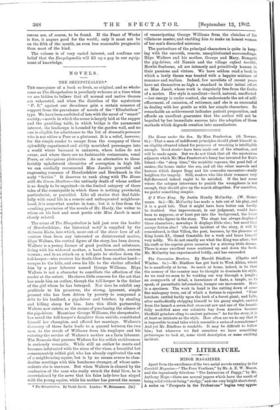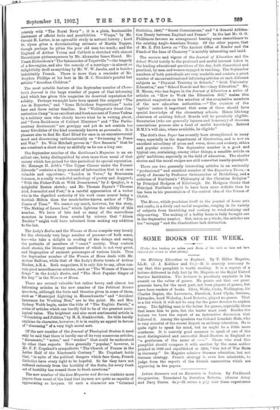CURRENT LITERATURE.
MINOR MAGAZINES.
Apart from the excellence of the two serial novels running in the Cornhill Magazine—" The Four Feathers," by Mr. A. E. W. Mason, and the ingeniously frivolous "The Intrusions of Peggy," by Mr. Anthony Hope—there are several papers which have the merit of being solid without being" stodgy," and one very bright short story. A series on "Prospects in the Professions" begins very appro.
priately with "The Royal Navy" ; it is a plain, businesslike statement of official facts and possibilities. "Wasps," by Mr. Oswald H. Latter, is an agreeable study in natural history ; Lord St. Cyres gives a discriminating estimate of Martin Tupper, though perhaps he pities the poor old man too much ; and the England of Arthur Young and Cobbett is sketched with almost Macaulayan picturesqueness by Mr. Alexander Innes Shand. Mr. Frank Richardson's " The Salamander of Toqueville "—the tragedy of a fire-engine, and also the comedy of a marriage—is almost as delightfully droll as anything by Mr. W. W. Jacobs, and is besides indubitably French. There is more than a reminder of Mr. Stephen Phillips at his best in Mr. H. C. Minchin's painful but artistic "Arcadian Children."
The most notable feature of the September number of Chaim- bers's Journal is the large number of papers of that informing kind which has given this magazine its deserved reputation for solidity. Perhaps we might have been spared the snippety "The Ass in Repartee," and "Some Hebridean Superstitions" looks here and there rather familiar. But "Wellington's Great Con- centration Camp" is an excellent and fresh account of Torres Vedras by a military man who clearly knows what he is writing about, and "Town Residences of Cabinet Ministers " and "The Parlia- mentary Restaurant" are gossippy and yet do not contain too many frivolities of the kind commonly known as personcdia. It is pleasant also to find Mr. Karl Blind for once in an uncontroversial mood and discoursing enthusiastically on "Swimming in Peace and War." Dr. Weir Mitchell proves in "New Samaria" that he can construct a short story as skilfully as he can a long one.
The September number of the Gentleman's Magazine is an ex- cellent one, being distinguished by even more than usual of that variety which has gained for this periodical its special reputation. Mr. Heneage H. Jebb's "The Upper Classes under the Former Edwards" contains a large amount of information that is at once valuable and opportune ; "London in Verse," by Benvenuta Solomon, is a really wonderful anthology of poetry and doggerel; "With the Fisher-Folk at Wild Douarnenez," by J. Quigley, is a delightful Breton sketch; and Mr. Thomas Bayne's "Thomas Aird, Journalist and Poet," is a careful appreciation of a writer who in the dignified austerity of his work came nearer being a Scottish Milton than the much-better-known author of "The Course of Time." We cannot say much, however, for the story, "The Making of Laura Lee," which lightens the solidity of this number. We have of late had so many of the marvellous monsters in human form created by science that "Alison Buckler" might well have refrained from making any addition to the list.
The Lady's Realm and the Woman at Home compete very keenly for the obviously very large number of persons—of both sexes, too—who take a delight in reading of the doings and seeing the portraits of members of "smart" society. They contain short stories, the literary excellence of which is not very great, and biographies of eminent personages of various kinds. Thus the September number of the Woman at Home deals with Mr. Arthur Balfour, while that of the Lady's Realm treats of Arthur Hacker,.A.R.A. Both magazines, it is only fair to say, often con- tain good miscellaneous articles, such as "The Women of Famous Songs" in the Lady's Realm, and "The Most Popular Singer of the Day" in the Woman at Home.
There are several valuable but rather heavy and almost too Informing articles in the new number of the Political Science Quarterly, although the facts and theories given in some of them, such as "Municipal Lighting in Massachusetts" and "Accident Insurance for Working Men," are to the point. Mr. and Mrs. Sydney Webb begin, under the title of "The English Parish," a series of articles which can hardly fail to be of the greatest socio- logical value. The brightest and also most sentimental article is "Friendship and Politics," by M. K. Simkhovitc.h. Its title hardly explains its character, however; it is in reality an appeal in favour Of "slumming" of a very high moral sort.
Of the new number of the Journal of Theological Studies it need only be said that there is hardly one of its very numerous articles, "documents," "notes," and "studies" that could be understood by other than experts. More generally "popular," however, is Mr. F. F. Urquhart's sympathetic "The Church of France in the Latter Half of the Nineteenth Century." Mr. Urquhart holds that, "in spite of the political dangers which face them, French Catholics have every right to be hopeful. So far they have not suffered seriously from the hostility of the State, for every fresh act of hostility has roused them to fresh exertions."
The new number of the Law Magazine and Review contains more Papers than usual of the kind that laymen are quite as capable of aPpreciating as lawyers. Of such a character are "Criminal
Statistics, 1900," "Secret Commissions," and "A General Arbitra- tion Treaty between England and France." In the last Mr. G. G. Phillimore favours an arrangement bearing some resemblance to the existing Anglo-American Treaty. Of the other papers, that of Mr. E. Pitt Lewis on "The Ancient Office of Reader and the Funds of the Inns of Chancery" is notably interesting and lucid.
The success and vigour of the Journal of Education and the School World testify to the profound and useful interest taken in the leading educational questions of the day, both theoretical and practical, by men and women engaged in teaching. The September numbers of both periodicals are very readable and contain a great number of unconventional and informing articles on such different subjects as "Physical Training in Schools," "Irish University Education," and "School Boards and Secondary Education." Mr. H Macan, who has begun in the Journal of Education a series of articles on "How to Work the Education Bill," makes this practical suggestion on the selection of the co-optative members of the new education authorities :—" The excision of the ` option ' makes it important that some of those should have special knowledge of the elementary schools. Hence life-long chairmen of existing School Boards will be peculiarly eligible. Secretaries (who are generally laymen and honorary) of diocesan associations possess also a fund of useful knowledge. Retired H.M.I.'s will also, where available, be eligible."
The Girrs Own Paper has recently been strengthened in many ways, especially in the department of illustration, and is now an excellent miscellany of prose and verse, dress and cookery, ethics and popular science. The September number is a good and typical one, containing, among other things, a sensible article on girls' ambitions, especially in the field of education. The shorter stories and the moral recipes are still somewhat namby-pambyish
There are two generally interesting articles in an eminently " professional " and excellent number of the Expository Times,—a study of Jerome by Professor Gratzmacher of Heidelberg, and a criticism of Fairbairn's "Philosophy of the Christian Religion" by Principal Hodgson of Edinburgh. Dr. Hodgson thinks that Principal Fairbairn ought to have been more definite than he has been in his presentation of the central idea of the Person of Christ.
The House, which proclaims itself as the journal of home arts and crafts, is a lively and useful magazine, ranging in its variety of subjects from furnishing and cookery to wood-staining and chip-carving. The making of a hobby horse is fully brought out in the September number. But, taken as a whole, the articles are too " scrappy " and the illustrations lack distinction.







































 Previous page
Previous page